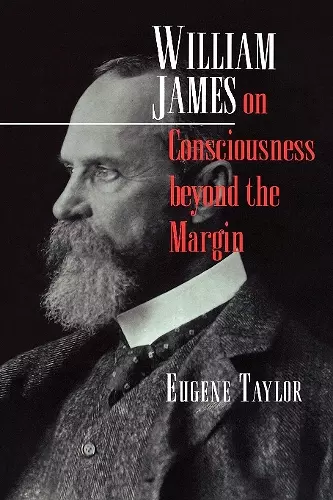William James on Consciousness beyond the Margin
Format:Paperback
Publisher:Princeton University Press
Published:19th Apr '11
Currently unavailable, and unfortunately no date known when it will be back

At the turn of the twentieth century, William James was America's most widely read philosopher. In addition to being one of the founders of pragmatism, however, he was also a leading psychologist and author of the seminal work, The Principles of Psychology (1890). While scholars argue that James withdrew from the study of psychology after 1890, Eugene Taylor demonstrates convincingly that James remained preeminently a psychologist until his death in 1910. Taylor details James's contributions to experimental psychopathology, psychical research, and the psychology of religion. Moreover, Taylor's work shows that out of his scientific study of consciousness, James formulated a sophisticated metaphysics of radical empiricism. In light of historical developments in psychology, as well as the current philosophic implications of the neuroscience revolution related to the biology of consciousness, Taylor argues that both the subject matter of James's investigations and his metaphysics of radical empiricism are just as important for psychology today as James believed they were in his own time. This book represents a major new contribution both to James scholarship and to the history of American psychology. Although philosophers have analyzed radical empiricism, this book is the first to trace the development of radical empiricism as a metaphysics addressed to psychologists. It is also the first to show James's involvement in depth-psychology and psychotherapeutics and to trace historical continuity between James's work on consciousness and subsequent developments in psychoanalysis, personality theory, and humanistic psychology.
"Taylor argues convincingly that throughout his life James was concerned with the totality of human experience, of which waking consciousness is but one aspect. Taylor concludes that the implications of James's person-centered, humanistic thought can bridge the gap between experimental and clinical psychology."--Library Journal "While James did fight labels all his life, he also created labels for the niches from which he could do strategic work. Taylor's patient examinations help us see that William James was both a hedgehog and a fox... Taylor's method of sticking with primary, often overlooked, texts proves itself adequate to casting new light on James, a goal often publicized but rarely achieved."--Tom D'Evelyn, Boston Book Review
ISBN: 9780691151144
Dimensions: unknown
Weight: 312g
232 pages